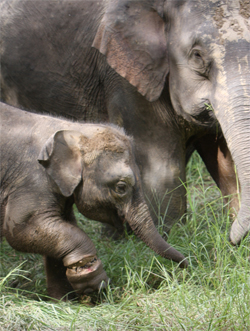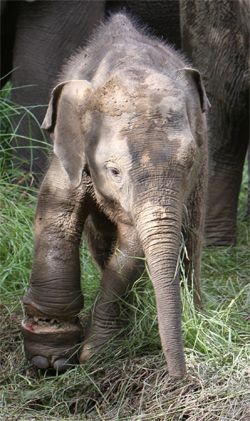Snares set by palm oil workers taking a toll on pygmy elephants of Borneo
mongabay.com
October 12, 2008
Warning: this article contains graphic pictures that may be unsuitable for some readers. The images show injuries to animals, specifically a baby elephant, caused by a snare. Continue at your own risk.
Wildlife rangers are finding increasing numbers of Borneo Pygmy elephants injured or killed by snares set by poorly paid oil palm plantation workers, reports Malaysia’s Sabah Wildlife Department.
“We have a bigger issue of elephants getting injured mostly due to man-made snare traps then dying from their injuries,” said Laurentius Ambu, Sabah Wildlife Department Director. “Besides being a cruel and inhumane way to kill wildlife it is also illegal and it leads to injuries and eventual death of not only elephants but also orang-utans, monkeys and other wildlife.”
 An injured young elephant by the banks of the Kinabatangan River close to the village of Bilit and the Lower Kinabatangan Wildlife Sanctuary.  The injured baby elephant with its mother. Dr. Senthilvel said the baby elephant was unlikely to survive. “As the severity of the wound on this elephant is so serious, this poor baby elephant would very soon succumb to gangrene and die. The sad thing is that even an attempt to rescue it and bring it in for treatment would probably mean amputation of the limb and a life in captivity. It would be all too cruel to have it live on and suffer in captivity, with a handicap like that.” These photos were taken by Inada Nobuhiro, a Japanese wildlife guide and lecturer. |
According to a statement released by the Sabah Wildlife Department, snares are usually set by oil palm plantation workers who are attempting to supplement their income by selling boar and deer meat to restaurants or eating it themselves. Elephants stumble into the traps and are snared. The resulting injury can lead to infection and even death. Young elephants are most at risk.
Dr. Senthilvel Nathan, Chief Field Veterinarian for the Sabah Wildlife Department, says that injured elephants can be difficult to treat due to their tight social structure.
“Elephants have a very complex social structure and are very protective and caring for their young. It would be a difficult task requiring a number of elephants to be sedated at once so that we can separate it from the group,” he said. “And we know elephants are highly intelligent and once they recognize that humans have taken one of their young this could develop into a more serious problem as they might become more aggressive towards humans.”
Human-wildlife conflict is a rising problem in Sabah — a Malaysian state on the island of Borneo — where large tracts of habitat have been destroyed for industrial oil palm plantations. As habitat is diminished, animals increasingly tread in agricultural areas in search of food or water. For migratory species like elephants, the problem is compounded since their routes often take them through ares that are now oil palm plantations.
“We have to address problems our elephants are facing now before it is too late and we find ourselves left with only a few hard choices,” said Laurentius. “Palm oil companies will also be liable if we find their workers are involved in such illegal activities.”
The Sabah Wildlife Department has been working on implementing an elephant management plan for Sabah in collaboration with HUTAN, WWF-Malaysia, and other NGOs.
Related articles
Malaysian palm oil industry accused of child slavery by Indonesia
(9/15/2008) Indonesia’s Commission for Child Protection has accused Malaysia’s oil palm planters of enslaving migrant workers and their children at plantations in the state of Sabah on the island of Borneo, reports The Jakarta Post. Arist Merdeka Sirait, secretary general of the commission, told the newspaper that a fact-finding team sent to Sabah discovered “tens of thousands of Indonesian migrant workers and their children had been ‘systematically enslaved,'” by Malaysian plantation owners.
Rainforest conversion to oil palm causes 83% of wildlife to disappear
(9/15/2008) Conversion of primary rainforest to an oil palm plantation results in a loss of more than 80 percent of species, reports a new comprehensive review of the impacts of growing palm oil production. The research is published in the journal Trends in Ecology and Evolution.
Researchers fit Bornean elephants with satellite collars to track social behvaior
(7/14/2008) Three Bornean Elephants were fitted with satellite collars over the past week in the Kinabatangan marking the beginning of the first study on their social structure.
Borneo’s pygmy elephants are an alien species
(4/18/2008) A new study suggests that the Borneo pygmy elephant — one of Borneo’s best known and charismatic animals — is actually an invasive species introduced from a neighboring island by a former sultan. The finding offers hope that in Borneo, the elephant can avoid the fate that befell it in its native Java: extinction.
Rare pygmy elephants endangered by logging in Borneo
(8/8/2007) Pygmy elephants are increasingly threatened by logging and forest conversion for agriculture in their native Borneo, reports a new satellite tracking study by WWF.